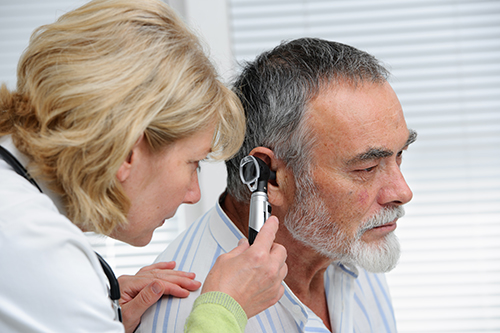![A new study from British researchers has identified several genes in mice associated with age-related conditions, including hearing loss, retinal degeneration, and osteoarthritis. [AlexRaths/Getty Images]](https://genengnews.com/wp-content/uploads/2018/08/Aug19_2016_Getty_504036173_EarExamination6218016318-1.jpg)
A new study from British researchers has identified several genes in mice associated with age-related conditions, including hearing loss, retinal degeneration, and osteoarthritis. [AlexRaths/Getty Images]
There’s an old anecdote about people losing their hearing as they get older because they have already heard, in their lifetime, everything good that needs to be said. While in certain instances this may be true, a new study from investigators at the Medical Research Council (MRC) Hartwell in the U.K. has identified several genes in mice associated with age-related conditions, including hearing loss, retinal degeneration, and osteoarthritis. The researchers are hopeful that their findings may lead to studies of the equivalent human gene and help develop screening programs to identify the risk of developing an age-related condition many years before symptoms appear.
“Our study is an important springboard for a better understanding of which genes in humans are involved in age-related conditions and how changes in those genes influence this,” explained lead study author Paul Potter, Ph.D., program leader of the mammalian genetics unit at MRC Hartwell. “This is a first and vital step in developing new therapies.”
Age is a risk factor for many conditions, including diabetes, cardiovascular disease, hearing loss, dementia, and others, yet the genes that we carry also influence whether we are more or less susceptible to these conditions. Unfortunately, little is currently known about which genes influence age-related conditions, or how they do so.
To explore this further, the MRC researchers introduced new mutations at random positions in the genes of mice before they were born and then monitored their health as they aged. If an age-related condition developed, the researchers investigated which particular gene in that mouse had been mutated.
The findings from this study were published recently in Nature Communications in an article entitled “Novel Gene Function Revealed by Mouse Mutagenesis Screens for Models of Age-Related Disease.”
“We report a large-scale genetic screen in mice employing a phenotype-driven discovery platform to identify mutations resulting in age-related disease, both late-onset and progressive,” the authors wrote. “We utilized N-ethyl-N-nitrosourea (ENU) mutagenesis to generate pedigrees of mutagenized mice that were subject to recurrent screens for mutant phenotypes as the mice aged. In total, we identified 105 distinct mutant lines from 157 pedigrees analysed, out of which 27 are late-onset phenotypes across a range of physiological systems.”
Interestingly, one gene the team identified was Slc4a10. This gene had already been known to be necessary for eye function, but this new study linked a defective version of Slc4a10 to age-related hearing loss for the first time.
“Using whole-genome sequencing we uncover the underlying genes for 44 of these mutant phenotypes, including 12 late-onset phenotypes,” the authors continued. “These genes reveal a number of novel pathways involved with age-related disease. We illustrate our findings by the recovery and characterization of a novel mouse model of age-related hearing loss.”
Identifying the role of the Slc4a10 gene in hearing loss and others related to late-onset conditions in mice could now prompt investigation of the same genes in humans to ask if naturally occurring mutations in them cause similar effects. The scientists are hopeful that in the future, screening people for defects in the genes identified could help to predict their chances of developing a particular condition, and the findings may one day inform treatment development or timing of interventions.
“As we get older, we have an increased risk of developing many conditions, including diabetes, cardiovascular disease, hearing loss, and dementia,” noted Lindsay Wilson, Ph.D., program manager for genetics and genomics at the MRC. “The genes that we carry can influence this, but it is hard to know which do, or how. This study increases our understanding of the genes related to aging and ill health and may ultimately help us to identify new treatments.”



